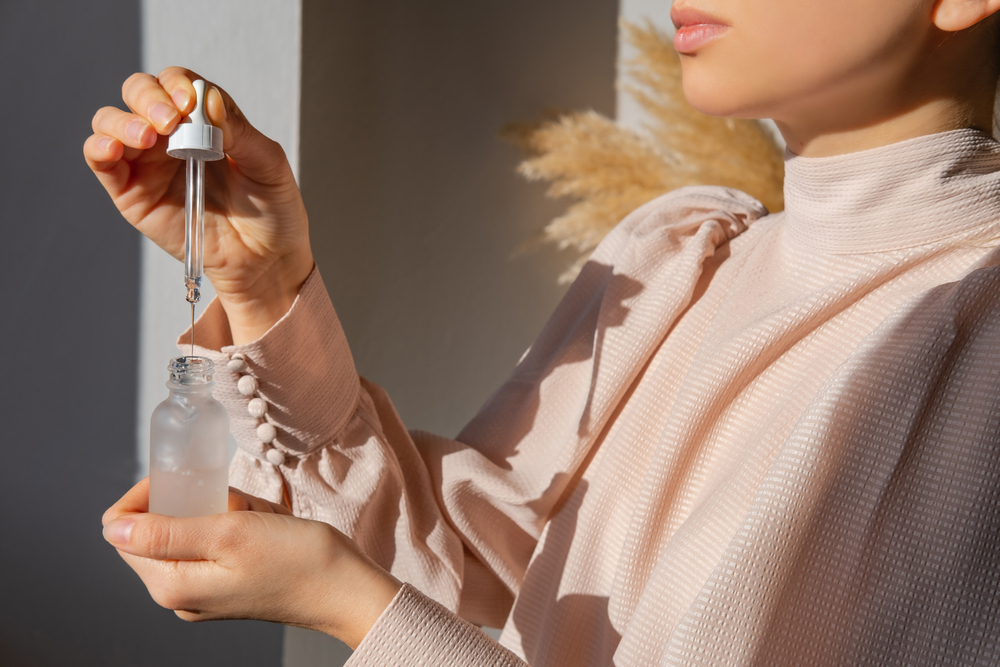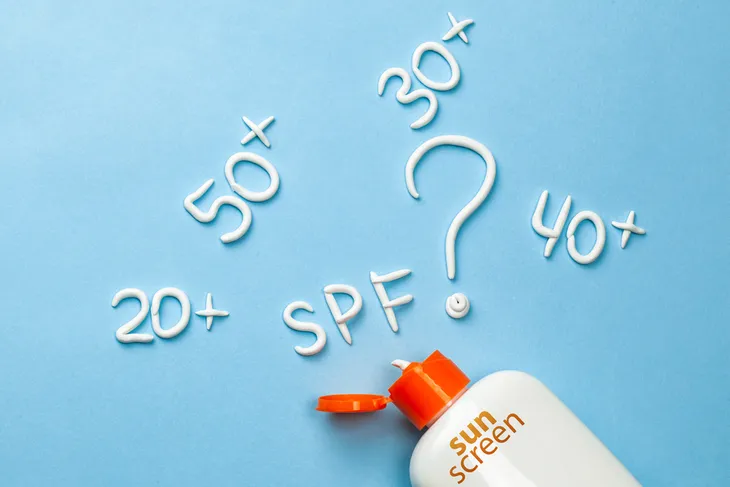- Retinol has many incredible benefits for the skin including reducing fine lines, treating acne, and improving skin texture.
- It is a powerful ingredient that must be incorporated at a low percentage and slowly to avoid overwhelming the skin. You must also always use SPF while using retinol since it can make your skin more sensitive to sun damage.
- The most common side effects experienced by those beginning with retinol is dry, irritated skin.
Retinol is a powerful skincare tool to promote anti-aging, skin rejuvenation and cell turnover. It’s long been considered a holy grail skincare ingredient that can truly transform the skin by minimizing wrinkles, improving texture, boosting collagen production and diminishing dark spots. If you’re considering adding a retinol into your skincare routine, it’s important to understand how to use it and what type of retinol is right for you since it can have some notable side effects.
Follow along as we walk through everything you need to know about retinol and how to effectively incorporate this powerhouse ingredient into your skincare routine.
What is Retinol?
To begin, it’s important to understand what exactly retinol is. Healthline describes retinol as a type of retinoid, which is derived from vitamin A. Retinol is made up of small molecules that penetrate deep into the middle layer of the skin to help neutralize free radicals. It also helps to boost the production of collagen, which is responsible for the elastic and “plumped” effect of youthful skin.
Retinol can help to reduce the appearance of fine lines, wrinkles, and enlarged pores. It can also help to treat acne, scarring, inflammation and bacteria. Lastly, it’s known for its ability to improve skin texture and tone.
 Shutterstock/AlexLMX
Shutterstock/AlexLMXRetinol vs. Retinoid
The terms “retinol” and “retinoid” are sometimes used interchangeably, but they actually have two different meanings. Retinoid is a general term for the entire Vitamin A family, but retinol is a very specific form of retinoid. The major difference between retinol and retinoid in the simplest of terms is the strength.
Retinol tend to be less intense and work gradually, while retinoid is a prescription medication that is stronger and works immediately, but with more potential side effects.
 Shutterstock/KaryB
Shutterstock/KaryBBenefits of Retinol
Retinol has a range of benefits and has long been considered one of the most powerful ingredients to transform the skin. Vitamin A is naturally produced in your skin but decreases as you age. In general, retinoids can help your body boost cell turnover, increase collagen production and can help with acne.
Retinol specifically can significantly improve sunspots, fine lines, wrinkles, melasma, hyperpigmentation, skin elasticity, and uneven skin texture.
 Shutterstock/popcorner
Shutterstock/popcornerSide Effects
While retinol does have the ability to drastically transform the skin, it does come with a few side effects that are important to note. The most common side effects experienced by those beginning with retinol is dry, irritated skin. It’s also common to experience redness, sun irritation, itchiness, flaking and even peeling skin.
It takes time for your skin to adjust to retinol, so it’s important to incorporate it gradually into your routine. It’s best to consult a professional if you experience any severe side effects including acne flair ups, eczema, discoloration, blistering, swelling or stinging.
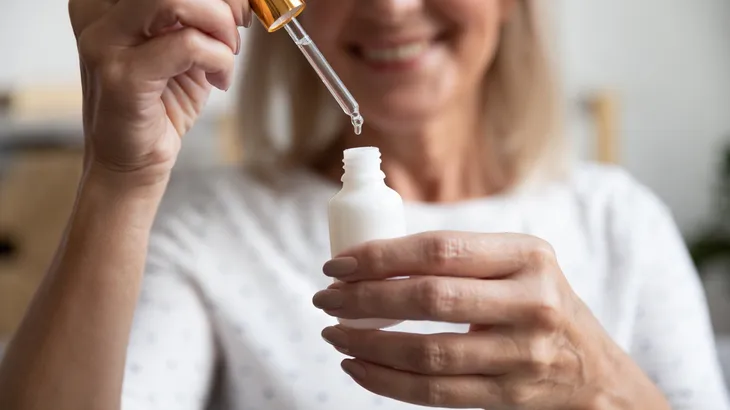 Shutterstock/fizkes
Shutterstock/fizkesBest Beginner Retinol
Retinol products are not all made equal and it’s crucial to do your research to ensure you’re choosing a retinol that works for your skin type and is gentle enough for beginners. Experts suggest looking for a formula that contains at least 0.1% retinol, retinyl esters or retinaldehyde. If you have super sensitive skin, you could also start even lower at 0.5% retinol.
Once your skin becomes accustomed to these formulas, you can gradually increase the percentage for maximum results. Formulas that are 3% will give truly effective results, but it may take up to a few years to build your skin up to this point.
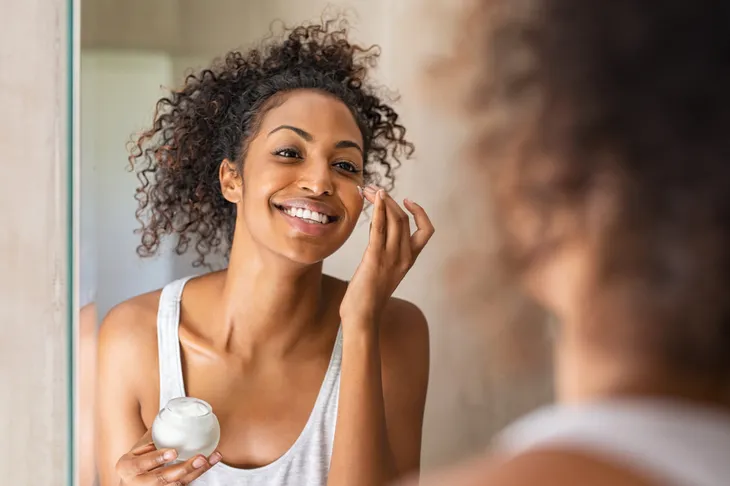 Shutterstock/Rido
Shutterstock/RidoWhen to Start Using Retinol
A common question when inquiring about retinol is exactly when you should start to use it. Most skincare professionals suggest that your 20s is a good time to start using retinol, more specifically, your mid-20s. Our skin begins showing signs of aging and losing collagen at around 25, so this could be a good time to start incorporating it.
It’s important to note that everyone’s skin is different and starts showing signs of aging at different times, but this is a general guideline for when it’s best to add a retinol to your routine.
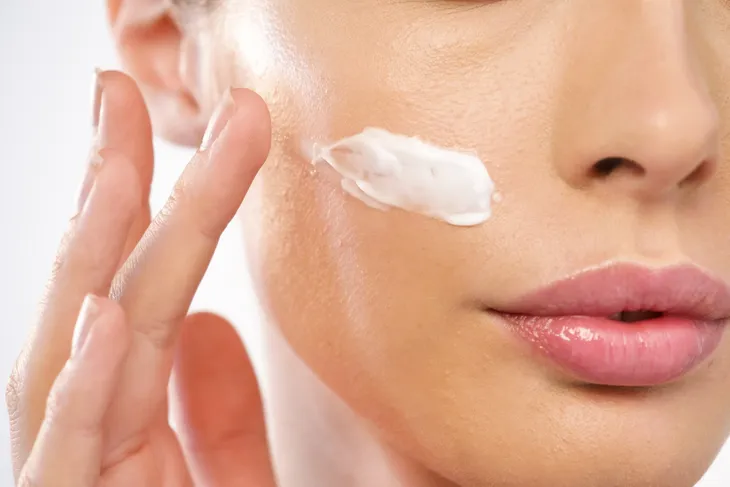 Shutterstock/HQuality
Shutterstock/HQualityHow to Apply Retinol
When it comes to applying retinol, experts recommend applying it at night after double-cleansing. Retinol tends to make the skin extra sensitive to the sun, so it’s best to use at night.
To apply, use a pea-sized amount of product and apply all over skin. Give the retinol a second to absorb, then finish with moisturizer. Retinol can really dry out the skin and cause irritation, especially if your skin leans on the sensitive side, so be sure to never skip moisturizer once your retinol is applied.
 Shutterstock/Prostock-studio
Shutterstock/Prostock-studioHow Often to Use Retinol
As previously mentioned, retinol often causes quite a few side effects, so it’s important to know exactly how to incorporate it into your skincare routine to minimize this. Experts suggest incorporating retinol gradually and with caution.
The standard recommendation is to begin using retinol once a week for the first two weeks. If your skin doesn’t become overly irritated, increase to twice a week for the next two weeks. After four weeks with limited irritation, you can begin to use retinol every other day. At this point you can decide if you wish to use it every night or stick with every other night.
 Shutterstock/Prostock-studio
Shutterstock/Prostock-studioSPF and Retinol
It’s important to wear SPF everyday to minimize your exposure to sun damage, but it’s even more crucial if you use a retinol on a regular basis. Retinol can make your skin more sensitive to the sunlight and can make your skin more prone to sun damaging effects such as burning, wrinkles and hyperpigmentation.
To ensure you’re protecting your skin from the sun, it’s recommended to only use retinol at night and apply SPF as part of your morning skincare routine. Be sure to also reapply your SPF throughout the day.
Ingredients to Avoid Using With Retinol
Retinol is a strong ingredient and there are certain products that are recommended to avoid using alongside it. One of the major skincare ingredients you should avoid using with retinol is chemical exfoliators such as AHAs and BHAs. The combination of retinol and these powerful exfoliators can leave the skin raw and sensitive. You can still use these ingredients in your skincare routine, but try to stagger their application. An easy way to do this is to rotate using retinol and exfoliator every other evening.
Another category of ingredients you should avoid using with retinol is astringents, toners and other drying products which may further contribute to further irritation. Benzyl peroxide, a common acne treatment, is another ingredient to avoid because it causes the retinol to oxidize, which makes it overall less effective.
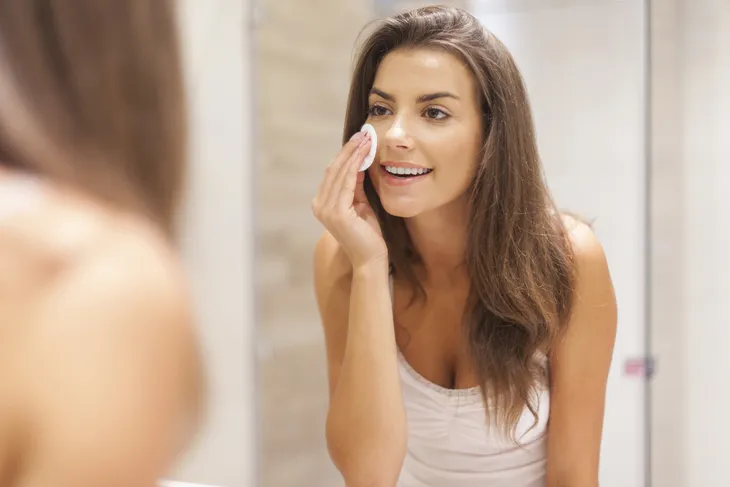 Shutterstock/gpointstudio
Shutterstock/gpointstudioRetinol and Skin Types
When it comes to retinol, it’s good to be aware of your skin type to know how this powerful ingredient will react on your skin. If you have oily skin, you’ll likely have an easier time incorporating retinol into your routine. You may even be able to avoid all the dryness and irritation that others experience with this product. Despite this, still be sure to work your way up slowly and start with a lower concentration of retinol.
If you have dry skin, you may run into more issues when you start using retinol. Be sure to use a rich moisturizer after you apply your retinol and monitor how your skin reacts. Be sure to start slow and increase potency as your skin can tolerate.
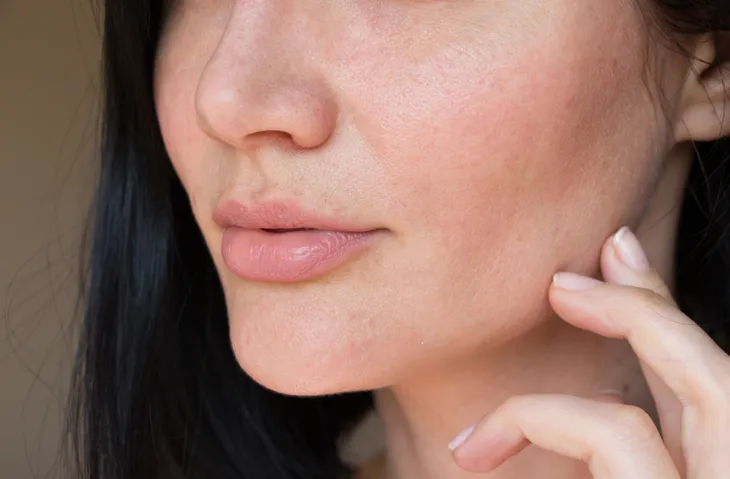 Shutterstock/Geinz Angelina
Shutterstock/Geinz AngelinaResults
When it comes to seeing results, you may need to be patient when it comes to retinol. Unless you are using a prescription retinoid, you likely won’t see any significant results until a minimum of twelve weeks, but it could take anywhere between 3 to 6-months. Retinol affects the deep layers of the skin and changes how your skin cells develop, which isn’t visible on the surface.
Be patient with this process and be sure to always moisturize after applying retinol to counteract any of the dryness or irritation that may occur during the first few weeks of use.
 Shutterstock/Irina Bg
Shutterstock/Irina Bg